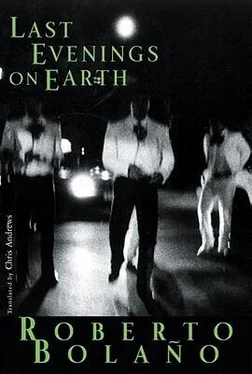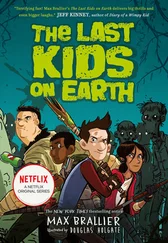Some months went by, three, maybe four. One night I heard the sound of a car pulling up outside my house. I thought it must have been someone who had got lost. I went out with the dog to see who it was. The car had stopped next to some brambles, with the motor running and the lights on. For a while, nothing happened. From where I was standing I couldn't see how many people were in the car, but I wasn't scared; with that dog at my side I was hardly ever scared. She was growling, keen to hurl herself on the strangers. Then the lights went off, the motor stopped, and the car's single occupant opened the door and greeted me like an old friend. It was Enrique Martin. I'm afraid I didn't reciprocate. The first thing he asked me was if I had received his letters. I said yes. No one had interfered with the envelopes? The envelopes were still properly sealed? I replied in the affirmative and asked him what was going on. Problems, he said, looking back at the lights of the village and the curving road, beyond which there was a stone quarry. Let's go inside, I said, but he didn't budge. What's that? he asked, meaning the lights and the noises from the quarry. I told him what it was and explained that at least once a year, I had no idea why, they kept working till after midnight. That's strange, said Enrique. Again I said, Let's go in, but either he didn't hear me or he pretended not to. I don't want to bother you, he said, after my dog had sniffed him. Come in, we'll have a drink, I said. I don't drink alcohol, said Enrique. I was at your book launch, he added. I thought you'd come. No, I didn't go, I said. Now he's going to start criticizing my book, I thought. I was hoping you could look after something for me, he said. That was when I realized he was holding a kind of package in his right hand; it looked like a bundle of A4 sheets. He's gone back to writing poetry, I thought. He seemed to guess what I was thinking. It isn't poetry, he said with a smile that was at once forlorn and brave, a smile I hadn't seen for many years, not on his face, at any rate. What is it, I asked? Nothing, just some stuff. I don't want you to read it; I only want you to look after it. All right, let's go inside, I said. No, I don't want to bother you, and anyway I'm late; I have to get going right away. How did you know where I live? I asked. Enrique named a mutual friend, the Chilean who had decided that one Chilean was enough for the first issue of White Rope. He's got a nerve, giving out my address, I said. You're not friends anymore? asked Enrique. I guess we are, I said, but we don't see each other much. Anyway I'm glad he did; it's been really nice to see you, said Enrique. I should have said: And to see you, but I just stood there. Well, I'm off, said Enrique. Then there was a series of very loud noises, like explosions, coming from quarry, which made him jumpy. I reassured him. It's nothing, I said, but in fact it was the first time I had heard explosions at that time of night. Well, I'm off, he said. Take care, I said. Can I give you a hug? he asked. Of course, I said. What about the dog, he won't bite me? It's a she, I said, and no, she won't.
For the next two years, while I lived in that house outside the village, I complied with Enrique's request and kept his packet of papers intact, fastened with tape and string, among old magazines and my own papers, which, it doesn't go without saying, multiplied at an alarming rate during that period. The only news I had of Enrique was supplied by the Chilean from White Rope; one day we talked about the magazine and the old days, and he clarified his role in the elimination of my poems, which was nonexistent, so he said, and so I concluded after listening to his account, not that it mattered to me by then. He told me that Enrique had a bookshop in the Barrio de Gracia, near his old apartment, which, years before, I had visited five times with the Mexican woman. He told me that Enrique and his wife had split up and no longer contributed to Questions Answers, and that his ex was working with him in the bookshop. They weren't living together anymore, he said, they were just friends, and Enrique gave her the job because she was out of work. And how's his bookshop going? I asked. Really well, said the Chilean; apparently he got a good severance package from the company where he'd been working since he was a teenager. He lives on the premises, he said. Behind the bookshop, in two smallish rooms. The rooms, I later found out, opened onto an interior courtyard, where Enrique grew geraniums, ficus, forget-me-nots, and lilies. There were two doors in the shopfront and a metal screen that he pulled down every night and locked, as well as a little door that opened onto the building's entrance hall. I didn't feel like asking the Chilean for the address. I didn't ask him whether or not Enrique was writing either. But shortly afterward I received a long letter from the man himself, signed this time, informing me that he had been in Madrid (I think he was writing from Madrid, but I'm not sure anymore) for the famous International Science Fiction Writers' Convention, No, he wasn't writing science fiction (I think he used the expression SF); he had been sent as a special correspondent by Questions Answers. The rest of the letter was muddled. He talked about some French writer whose name didn't ring a bell, according to whom we are all aliens, "we" meaning every living creature on planet Earth; exiles, all of us, wrote Enrique, or outcasts. Then he explained just how it was that the French writer had reached this harebrained conclusion.
But that part was incomprehensible. He mentioned the Thought Police, speculated about Hyper-dimensional tunnels, and went gabbling on the way he used to in his poems. The letter ended with an enigmatic sentence: All who know are saved. Then there were the conventional closing formulae. It was the last letter he wrote to me.
Again it was our mutual Chilean friend who filled me in and told me the latest news. We were having a meal together, during one of my increasingly frequent trips to Barcelona, and in the course of the conversation he let it drop, casually, without dramatizing the facts.
Enrique had been dead for two weeks. It had happened more or less like this: one morning his ex-wife, now his employee at the bookshop, arrived and found the premises still locked. This surprised her, but she was not alarmed, because Enrique sometimes slept in. For such occasions she had her own key, with which she proceeded to unlock the metal screen and then the glass door in the shopfront. She went straight to the apartment at the back, and there she found Enrique hanging from a rafter in his bedroom. The sight almost gave her a heart attack, but she pulled herself together, called the police, shut the shop and waited outside, sitting on the curb, crying, I suppose, until the first patrol car pulled up. When she went back in, she was surprised to find Enrique still hanging from the rafter. While the police were asking her questions, she noticed that the walls of the room were covered with numbers, big and small, some painted with a stencil, others with spray paint. She remembered the policemen taking photos of the numbers (659983 + 779511 -336922, that sort of thing: incomprehensible) and Enrique looking down at them dismissively. The ex-wife turned employee thought the numbers represented debts he had run up. Yes, Enrique was in debt, not much, not enough for anyone to want to kill him, but he did have debts. The policemen asked her if the numbers had been on the walls the previous day. She said no. Then she said she didn't know. She didn't think so. She hadn't been in that room for a while.
They checked the doors. The one that opened onto the entrance hall was locked from the inside. They found no sign that any of the doors had been forced. There were only two sets of keys: she had one and they found the other next to the cash register. When the investigating magistrate arrived, they took Enrique's body down and removed it from the premises. The findings of the autopsy were conclusive: he had died almost instantly, by his own hand, another one of Barcelona's frequent suicides.
Читать дальше












